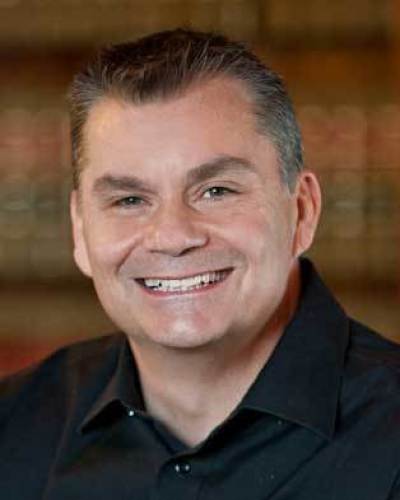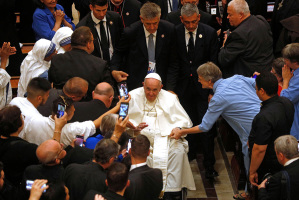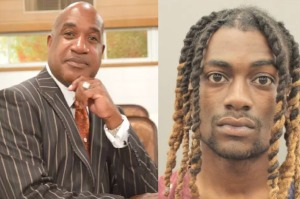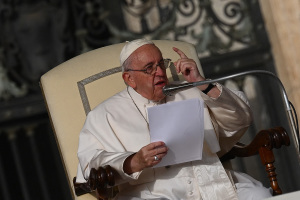People of the lie

The name John Cleese may be unfamiliar to many today, but any comedy lover growing up in the 1970’s / 80’s laughed until they cried watching Cleese and the rest of the Monty Python crew. Whether it was the Flying Circus television show or movies like Holy Grail, their influence on comedy has been compared to the Beatle’s impact on music.
Over 30 years ago, Cleese did a short comedic spot on the subject of political extremist behavior, something we’re seeing a lot of these days. Going over the benefits of being an extremist in tongue-in-check style, he says this:
“The biggest advantage of extremism is that it makes you feel good because it provides you with enemies. Let me explain: the great thing about having enemies is that you can pretend that all the badness in the whole world is in your enemies and all the goodness in the whole world is in you. Attractive isn't it?
So, if you have a lot of anger and resentment in you anyway, and you therefore enjoy abusing people, then you can pretend you’re only doing it because these enemies of yours are such very bad persons. And if it wasn’t for them you’d actually be good-natured, courteous, and rational at all the time.
Once you’re armed with your super list of enemies, you can be as nasty as you like and feel that your behavior is morally justified. So, you can strut around abusing people and telling them you can eat them for breakfast and still think of yourself as a champion of the truth, a fighter for the greater good and not the rather sad paranoid schizoid that you really are.”
Cleese’s short comedy bit could have easily been written this year instead of in the previous century. Not only does it perfectly describe the current political and philosophical divisiveness we see in America, but it also highlights the false personal moral philosophy that many live out every day.
Probing Human Evil
The famous psychiatrist and author of the widely-read book The Road Less Traveled, M. Scott Peck, wrote a lesser-known work in the late 1990’s entitled People of the Lie. In it, Peck examined the concept of human evil along with how and why it manifests.
Providing numerous psychiatric case studies throughout the book, Peck lands on several characteristics of human evil, which are not usually top-of-mind when one thinks of wicked personalities. However, the traits he identifies are on full, raging display in our current culture.
Echoing the things said by Cleese in his comedy bit, but being completely serious, Peck says: “It is the characteristic of those who are evil to judge others as evil. Unable to acknowledge their own imperfection, they must explain away their flaws by blaming others. And, if necessary, they will even destroy others in the name of [their own] righteousness. . . .If they do not have an enemy, they will create one in short order.”[1]
Those who are evil, says Peck, build their moral framework on lies, which is “both a cause and manifestation of evil”.[2] Their ‘good’ is simply a façade, which Peck describes this way: “The words ‘image’, ‘appearance’, and ‘outwardly’ are crucial to understanding the morality of the evil. While they seem to lack any motivation to be good, they intensely desire to appear good. Their ‘goodness’ is on a level of pretense. It is, in effect, a lie. This is why they are the ‘people of the lie’.”[3]
Whitewashed Tombs
Peck’s conclusions that describe the type of behavior we see lived out in America are also found multiple times in Scripture, perhaps most notably in the lives of the Pharisees and their dealings with Jesus. Look at how Peck’s words like “outwardly” and “appearance” are used by Jesus to describe the supposed religious cream-of-the-crop of His day:
“Woe to you, scribes and Pharisees, hypocrites! For you clean the outside of the cup and of the dish, but inside they are full of robbery and self-indulgence. You blind Pharisee, first clean the inside of the cup and of the dish, so that the outside of it may become clean also. Woe to you, scribes and Pharisees, hypocrites! For you are like whitewashed tombs which on the outside appear beautiful, but inside they are full of dead men’s bones and all uncleanness. So you, too, outwardly appear righteous to men, but inwardly you are full of hypocrisy and lawlessness” (Matt. 23:25-28, my emphasis).
What Jesus describes manifested in the Pharisees via their constant lies about Him (e.g. Matt. 9:34), rejection of His Messianic proof that they witnessed with their own eyes (e.g. Matt.12:13), false legal charges (e.g. Matt. 26-59-61), physical brutality (e.g. Matt. 26:67-68), and ultimately, murder (e.g. John 11:53, 12:9-11). They preached one thing, and yet practiced the evil, polar opposite.
Today we see the same activities lived out by our own People of the Lie, all of which are dipped in a vat of delusion that lets them – as Cleese puts it – believe they are a “a champion of the truth, a fighter for the greater good”.
However, Paul tells us that they are living a hypocritical life: “Therefore you have no excuse, everyone of you who passes judgment, for in that which you judge another, you condemn yourself; for you who judge practice the same things. . . .[If you] are confident that you yourself are a guide to the blind, a light to those who are in darkness, a corrector of the foolish, a teacher of the immature, having in the Law the embodiment of knowledge and of the truth, you, therefore, who teach another, do you not teach yourself?” (Rom. 2:1, 19-21).
The only antidote for such thinking is for God to cancel the current spirit that is “according to the course of this world, according to the prince of the power of the air, of the spirit that is now working in the sons of disobedience” (Eph. 2:2), and transform them by “the renewing of their mind” (Rom. 12:2) through the Holy Spirit.
As it is with most every other moral ill facing the world, nothing provides a permanent fix to human evil and People of the Lie except the gospel of Christ.
[1] M. Scott Peck, People of the Lie (Touchstone, 1998), pg. 255, 225.
[2] Ibid, pg. 242.
[3] Ibid, pg. 75.
Robin Schumacher is a former software executive and Christian apologist who has written many apologetic articles, appeared on nationally syndicated radio programs, and presented at various apologetic events. He holds a Master's in Christian apologetics and a Ph.D. in New Testament.





























